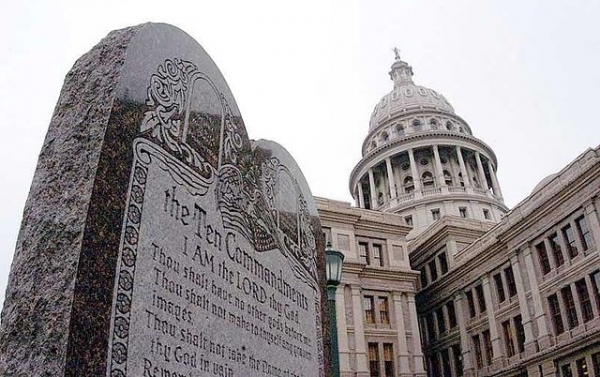
A photo of Oklahoma state Governor Mary Fallin taken on September 2012.
Oklahoma Governor Mary Fallin overrode a Supreme Court decision to remove the Ten Commandments monument from the State Capitol on Monday, July 6. Fallin emphasized the influence of the Ten Commandments in American history and legal system, while reminding officials that the United States government is run by a system of checks and balances. Her announcement follows the Supreme Court’s decision in the case of Prescott vs. Oklahoma Preservation Commission on Tuesday, June 30.
Due to its religious nature, the Oklahoma Supreme Court (OSC) reached a 7-2 vote in favor of removing a statue of the Bible’s Ten Commandments from State Capitol grounds. The monument is a 6’ tall granite statue that is engraved with ten laws, which summarize the entirety of 613 Old Testament commandments. The Ten Commandments are teachings that regard man’s relationship with God and to other people. It is nearly identical to a monument at the Texas State Capitol building.
The monument was constructed through private funds from Republican House Representative Mike Ritze. Ritze represents the 80th district in Broken Arrow, Oklahoma. KOCO 5 News reports that Ritze and his family paid about $10,000 for the monument. The original monument was installed in 2012 and destroyed due to an act of vandalism in 2014. It was replaced in January 2015. Ritze introduced “The Ten Commandments Monument Display Act,” also known as House Bill 1330 in 2009, which authorized the construction of the monument.
“Oklahoma is a state where we respect the rule of law, and we will not ignore the state courts or their decisions. However, we are also a state with three co-equal branches of government," Fallin said in a statement. “Legislators and supporters of the monument intended it as a tribute to the importance of the Ten Commandments in our history and our system of laws. Celebrating the historical importance of religions and religious values is not a new idea. Our nation is steeped in references to God and the rights He bestows on all men and women.”
The OSC based its decision on Article 2, Section 5 of the Oklahoma State Constitution which states that “no public money or property shall ever be appropriated, applied, donated, or used, directly or indirectly, for the use, benefit, or support of any sect, church, denomination, or system of religion, or for the use, benefit, or support of any priest, preacher, minister, or other religious teacher or dignitary, or sectarian institution as such.” Plaintiff Bruce Prescott, an ordained Baptist minister filed a lawsuit contesting for a separation of church and state.
In an interview with The Washington Post, Prescott said that he was not “opposed to Ten Commandment monuments,” but was “opposed to them on government property.” The plaintiff said that “the significance and the value of the words” were “completely destroyed” because “a covenant between God and his people” were made into “a secular monument.” Prescott queried, “If you’re saying that it’s no longer religious, what have you done to religion?” The lawsuit first began in August 2013.

A photo of the Texas Ten Commandments Monument in Austin taken on March 2005.

















